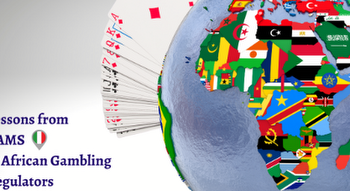Bolstering Africa’s Gambling Industry through Technology
The global gambling market continues to witness exponential growth. Whilst there are still concerns, there are arguments that the gambling industry can be beneficial to a country if it is well regulated. According to The Business Research Company, the global gambling market is expected to reach a value of around $565.4 billion, growing at an annual rate of 5.9% through 2022. All indications are that the gambling industry is experiencing a boom across the world, and Africa is no exception.
The two largest gambling markets in Africa are South Africa and Nigeria. South Africa’s Gross Gaming Revenue (GGR) is estimated to reach $2.5 billion in 2021. In the 2019-2020 financial year, the revenue generated by the sector stood at R33 billion ($2.2 billion). That translated into taxes amounting to R3.2 billion ($220 million) to the South African government. According to the Nigerian Minister for Special Duties and Intergovernmental Affairs, George Akume, Nigeria’s gambling industry, in 2019, grossed over N250 billion ($607 million). Kenya is another gambling market of interest, currently ranking as the third largest in Africa. The estimated size of the sector is $40 million, as of 2020, and continues to grow as per data provided by Slotegrator. In Ghana, the revenue from console games hit $6.3 million in 2018, and forecasts suggest that it will increase to $9.3 million by 2023.
Those figures depict a sector with huge potential and African governments can leverage a lot more on this industry by investing the earnings in sports and other development projects. Indeed, many states have approved commercial casino gambling, primarily because they see it as a tool for economic growth. The greatest benefits are increased employment, greater tax revenue to state and local governments, and growth in local retail sales – but this is hinged on effective regulation of the sector.
Africa’s growing young population and uptake of internet and smartphone technology have further driven growth of this sector, with Futuresource Consulting, a specialist research and knowledge-based consulting company, estimating that the annual audience size in the region will grow from 30 million in 2020 to 53 million by 2023.
According to the World Financial Review, Africa is currently experiencing an online gambling revolution, with at least 30% of the continent taking part in one form of online gambling or the other. With the launch of 4G and 5G networks across Africa, internet connectivity has also increased. The implication of the powerful 4G network and website development in Africa has led to the influx of players into its online gambling landscape. 4G networks have steadily been increasing in many African countries and there are some countries that have already began the roll-out of 5G networks. These include countries like South Africa and Kenya, and Nigeria has announced that they too will begin rolling out 5G soon.
But to ensure that these revenues are maximized there must be oversight of the sector by regulators and governments. There are a few recent examples of African governments streamlining their efforts in ensuring transparency across this sector while driving revenue assurance. Earlier this year, the Federal Government of Nigeria indicated its intention to acquire a central monitoring system specifically for the gambling industry. This system is intended to support the Nigerian government and the National Lottery Regulatory Commission (NLRC) conduct their oversight role of the sector and help reduce the rate of revenue leakages. Despite the large revenue generated by Nigeria’s gambling sector in 2019, the government only received a meagre N1 billion ($2 million), clearly highlighting the need for improved revenue collection in the sector.
Likewise, other countries, including Ghana, could follow a similar route over the next 2 years. The success of utilising this type of technology is evident across the globe and will greatly benefit the growing gambling market of Africa too. Similar systems have been employed by other countries to monitor and regulate sectors such as telecommunications and their success can be replicated by the system Nigeria is looking at employing.
With the recent spike in gambling, future transformations in the industry are inevitable. The greater interest in gambling may accelerate a shift – already underway – towards the delivery of games via mobile and cloud-based platforms. Africa take advantage of this boom and adopt the use of technologies that ease the oversight of the sector, so as to maximise on the revenues being generated as more forms of gambling become legal.
*David is a Bloomberg trained Financial journalist with interests in business education and communication. He lives in Lagos.





































